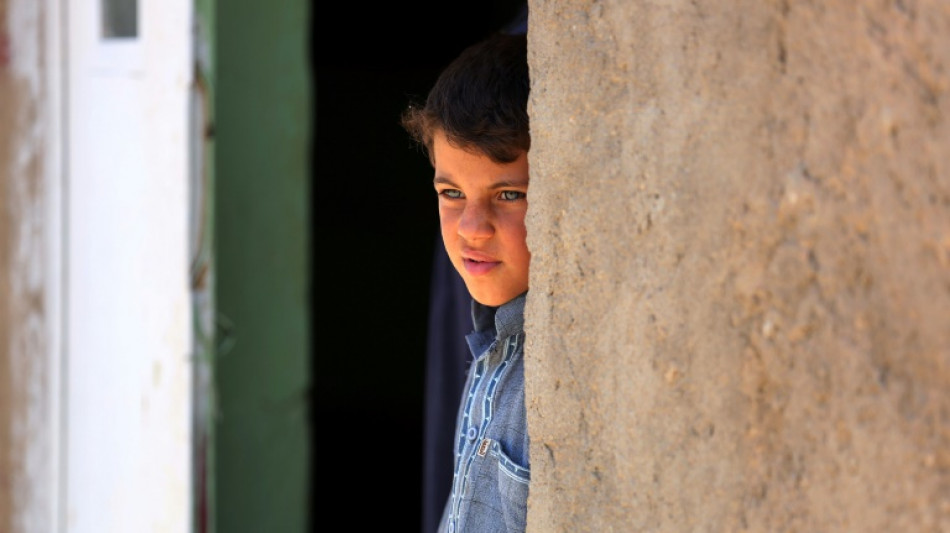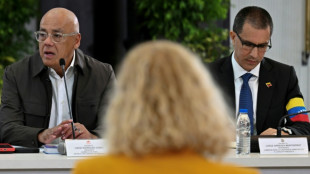
-
 NFL names 49ers to face Rams in Aussie regular-season debut
NFL names 49ers to face Rams in Aussie regular-season debut
-
Bielle-Biarrey sparkles as rampant France beat Ireland in Six Nations

-
 Flame arrives in Milan for Winter Olympics ceremony
Flame arrives in Milan for Winter Olympics ceremony
-
Olympic big air champion Su survives scare

-
 89 kidnapped Nigerian Christians released
89 kidnapped Nigerian Christians released
-
Cuba willing to talk to US, 'without pressure'

-
 Famine spreading in Sudan's Darfur, UN-backed experts warn
Famine spreading in Sudan's Darfur, UN-backed experts warn
-
2026 Winter Olympics flame arrives in Milan

-
 Congo-Brazzaville's veteran president declares re-election run
Congo-Brazzaville's veteran president declares re-election run
-
Olympic snowboard star Chloe Kim proud to represent 'diverse' USA

-
 Iran filmmaker Panahi fears Iranians' interests will be 'sacrificed' in US talks
Iran filmmaker Panahi fears Iranians' interests will be 'sacrificed' in US talks
-
Leicester at risk of relegation after six-point deduction

-
 Deadly storm sparks floods in Spain, raises calls to postpone Portugal vote
Deadly storm sparks floods in Spain, raises calls to postpone Portugal vote
-
Trump urges new nuclear treaty after Russia agreement ends

-
 'Burned in their houses': Nigerians recount horror of massacre
'Burned in their houses': Nigerians recount horror of massacre
-
Carney scraps Canada EV sales mandate, affirms auto sector's future is electric

-
 Emotional reunions, dashed hopes as Ukraine soldiers released
Emotional reunions, dashed hopes as Ukraine soldiers released
-
Bad Bunny promises to bring Puerto Rican culture to Super Bowl

-
 Venezuela amnesty bill excludes gross rights abuses under Chavez, Maduro
Venezuela amnesty bill excludes gross rights abuses under Chavez, Maduro
-
Lower pollution during Covid boosted methane: study

-
 Doping chiefs vow to look into Olympic ski jumping 'penis injection' claims
Doping chiefs vow to look into Olympic ski jumping 'penis injection' claims
-
England's Feyi-Waboso in injury scare ahead of Six Nations opener

-
 EU defends Spain after Telegram founder criticism
EU defends Spain after Telegram founder criticism
-
Novo Nordisk vows legal action to protect Wegovy pill

-
 Swiss rivalry is fun -- until Games start, says Odermatt
Swiss rivalry is fun -- until Games start, says Odermatt
-
Canadian snowboarder McMorris eyes slopestyle after crash at Olympics

-
 Deadly storm sparks floods in Spain, disrupts Portugal vote
Deadly storm sparks floods in Spain, disrupts Portugal vote
-
Ukrainian flag bearer proud to show his country is still standing

-
 Carney scraps Canada EV sales mandate
Carney scraps Canada EV sales mandate
-
Morocco says evacuated 140,000 people due to severe weather

-
 Spurs boss Frank says Romero outburst 'dealt with internally'
Spurs boss Frank says Romero outburst 'dealt with internally'
-
Giannis suitors make deals as NBA trade deadline nears

-
 Carrick stresses significance of Munich air disaster to Man Utd history
Carrick stresses significance of Munich air disaster to Man Utd history
-
Record January window for transfers despite drop in spending

-
 'Burned inside their houses': Nigerians recount horror of massacre
'Burned inside their houses': Nigerians recount horror of massacre
-
Iran, US prepare for Oman talks after deadly protest crackdown

-
 Winter Olympics opening ceremony nears as virus disrupts ice hockey
Winter Olympics opening ceremony nears as virus disrupts ice hockey
-
Mining giant Rio Tinto abandons Glencore merger bid

-
 Davos forum opens probe into CEO Brende's Epstein links
Davos forum opens probe into CEO Brende's Epstein links
-
ECB warns of stronger euro impact, holds rates

-
 Famine spreading in Sudan's Darfur, warn UN-backed experts
Famine spreading in Sudan's Darfur, warn UN-backed experts
-
Lights back on in eastern Cuba after widespread blackout

-
 Russia, US agree to resume military contacts at Ukraine talks
Russia, US agree to resume military contacts at Ukraine talks
-
Greece aims to cut queues at ancient sites with new portal

-
 No time frame to get Palmer in 'perfect' shape - Rosenior
No time frame to get Palmer in 'perfect' shape - Rosenior
-
Stocks fall as tech valuation fears stoke volatility

-
 US Olympic body backs LA28 leadership amid Wasserman scandal
US Olympic body backs LA28 leadership amid Wasserman scandal
-
Gnabry extends Bayern Munich deal until 2028

-
 England captain Stokes suffers facial injury after being hit by ball
England captain Stokes suffers facial injury after being hit by ball
-
Italy captain Lamaro amongst trio set for 50th caps against Scotland


20 years after US invasion, war-scarred Iraq faces uncertain future
Iraq on Monday marked 20 years since the start of the US-led invasion that toppled dictator Saddam Hussein, but no official celebrations were held.
The oil-rich country remains traumatised from the years of war, occupation and bloody sectarian turmoil that followed the operation launched on March 20, 2003.
A semblance of normalcy has returned but Iraq still battles a range of entrenched challenges, from political instability to poverty and rampant corruption.
Neighbouring Iran, the major Shiite power and arch-foe of the United States, now wields much influence in Iraq, whose Shiite majority was freed from the oppression of Sunni strongman Saddam.
Prime Minister Mohamed Shia al-Sudani, who is backed by a pro-Iranian coalition, at an event Sunday did not speak of the US invasion but only of the "fall of the dictatorial regime" of Saddam, who was caught, tried and executed.
At a Baghdad conference on the eve of the anniversary, Sudani said: "We remember the pain and suffering of our people in those years that were dominated by senseless wars and systematic sabotage."
The government planned no events to mark the anniversary, and Baghdad's streets on Monday looked busy as ever, with most people more focused on the holy fasting month of Ramadan due to start later this week.
"It's a painful memory" for the country, said Fadhel Hassan, 23, a journalism student. "There was a lot of destruction and too many victims -- innocent people, Iraqis and American soldiers."
The US march to war started under then-president George W. Bush and gained pace in the aftermath of the September 11, 2001 attacks on the United States by Osama bin Laden's militant group Al-Qaeda.
Bush, backed by British prime minister Tony Blair, argued that Saddam presented a major threat and was developing weapons of mass destruction, although none were ever found.
- 'Shock and awe' -
Operation Iraqi Freedom was launched with a ground invasion led by 150,000 US and 40,000 British forces, and the "shock and awe" bombing of strategic sites.
Within three weeks, Saddam's regime had fallen, and the invasion forces took control of the capital Baghdad on April 9.
TV footage beamed around the world soon showed US Marines toppling a giant statue of Saddam, and later Bush declaring the "Mission Accomplished" aboard an American warship.
But the invasion had sparked widespread disorder and looting, the chaos deepened by the US decision to disband the Iraqi state, ruling party and military apparatus.
The stated US drive to bring liberal democracy to Iraq was soon derailed by violence and sectarian conflict as Shiite militants battled with Sunni groups.
By the time US troops left in 2011, the war had claimed the lives of more than 100,000 Iraqi civilians, according to the Iraq Body Count group, while US losses reached nearly 4,500.
The bloodshed would give rise to the Sunni extremists of the Islamic State group whose jihadist "caliphate" brought new horrors across Iraq and Syria before its eventual defeat, after a US-led coalition returned to help fight them.
- 'Corruption pandemic' -
In today's Iraq, elections are held, political plurality is encouraged and free expression officially guaranteed.
But in practice, Iraqi politics remain chaotic and marred by sectarian and ethnic conflict.
Major anti-government protests erupted in late 2019, leading to yet more bloodshed in the streets.
Turnout was low for legislative elections in October 2021, which sparked further infighting and violence before a government was eventually formed a year later.
A third of Iraq's population lives in poverty, public services are largely absent, and the energy-rich country suffers frequent blackouts, especially in the extreme summer heat.
Nepotism and corruption remain rife in Iraq, where coveted posts in a bloated state sector are often gained through personal connections while youth unemployment is rampant.
Successive governments "have failed to fight corruption", laments Abbas Mohamed, a Baghdad engineer in his 30s. "We are going from bad to worse. No government has given anything to the people."
On Sunday, Sudani again pledged to "combat the pandemic of corruption".
But Baghdad day labourer Mohamed al-Askari, like many Iraqis, is struggling to keep alive any real hope.
"We rejoiced when the regime fell because we thought Iraq would improve," he said, "but so far we have only suffered."
V.Said--SF-PST




